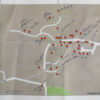Over the weekend, I had a message from a friend I used to work with on an online magazine in Tenerife. He received an email from Copytrack, a company who police the internet on behalf of photographers, photo agencies, and publishers looking for ‘stolen’ images (photos used without permission). Copytrack requested payment on behalf of their client, WENN (World Entertainment News Agency) for unauthorised use of an image.
The thing is, the image in question was mine.
It was of a location setting for the movie Clash of the Titans which was partly filmed on Tenerife back in 2009. I was driving home from a trip to the south of Tenerife and decided to head through Teide National Park rather than stick to the autopista (Tenerife’s version of a motorway). As I drove through the sprawling volcanic crater, I spotted a temple and statues of Greek gods Obviously, Greek gods and a Spanish island don’t go together, so I stopped to investigate, and take some photos to prove to Andy I wasn’t hallucinating.
I used the photos in an article in the magazine and posted some images on photo sharing site flickr. Someone who worked for WENN spotted them and contacted me asking to buy an image. Unfortunately, they had a tight deadline for a magazine piece, and we had limited internet access at that time, so I didn’t spot their message until it was too late. They didn’t get the photo; I didn’t get any payment.
So, as you can imagine, I was surprised to find Copytrack attempting to collect payment for the photo. Their role is to protect photographer’s rights. I can only assume it is some system error on the part of both WENN and Copytrack. But it begs the question, what systems do they have in place to check the images they’re asked to ‘hunt down’ actually belong to the people who say they own them?
There’s no way they have the full resolution photo, as only I have that. They can’t even know the spot from which it was taken because there would have to have been someone standing on my head when I took it to know that. It wasn’t from a road or even a path. I had to cross a few lava bumps to get it.
It could be the systems in place haven’t done the job they’re designed for. This is something which seems to be commonplace. IT races forward at a rapid pace, and some people struggle to keep up. I’ve mentioned unconscious incompetence before. It’s something we’ve experienced a lot of late, people revealing what they don’t know by what they say and do.
Once, a shop assistant in Interflora in Stockport tried to tell us an order for flowers to Scotland was taking a while to process online because Scotland was a long way away and the request had to travel up the line.
From recent experiences, things haven’t improved that much, even among a more technologically savvy generation. The internet is full of information, but that doesn’t necessarily equate to better knowledge. Take the complaints handler for utility company E.ON. Andy is dealing with them on behalf of her brother. First, the complaint handler didn’t really comprehend what Alzheimer’s was, so couldn’t understand why her phoning Andy’s brother to check details of electricity usage was not the most sensible suggestion. Then, in response to a question why E.ON’s systems hadn’t picked up a smart meter had never worked since installation two years previously, the response was, ‘You can’t expect E.ON to manually check everyone’s meter is working.’ No, but I do expect its IT system to have that capability. She couldn’t grasp that concept.
There’s been talk of NHS reform. It’s long overdue. We’ve had experiences of various NHS departments in different parts of the UK and one thing has been evident, IT systems aren’t fit for purpose. There have been numerous duplicate consultations because info isn’t shared as effectively as it should be, some involving serious medical conditions, others more standard health checks. It’s unnecessarily time-consuming and a waste of staff resources and funding. Sort some of those with more integrated systems and it is instant savings, probably on a monumental scale.
There can also be instances of the cart leading the horse. At a regular health check-up, Andy had to answer several questions, some relating to physical activity. Because she doesn’t go to a gym or take part in any sport, her records were noted as being ‘relatively inactive’ because there was no scope for information that didn’t fit the questionnaire.
We put together long-distance walking holidays. At the weekend, we hiked a route that was almost 18km long. And yet ‘walking’ didn’t really count, so we’re statistically ‘relatively inactive.’ That one really struck a nerve with me.
There are numerous examples like these, where people either don’t fully understand how their systems work or where they allow themselves to be led by them. Years ago, I was recruiting for the DWP with another manager. We had a standardised process to follow. At the end of a day of interviewing candidates, the system’s choice didn’t match the person we both thought was most suited for the job. What did we do? We ignored the system. It was, after all, only a tool.
I’ve sent an email to Copytrack, pointing out the image they contacted my friend about belongs to me, with evidence to back this up. What will they do? The answer depends on whether they employ humans who use systems as tools, or humans who are slaves to a system.
Update: Copytrack got back to me, informing me they had closed the claim and removed the image from their database. It’s good to know there are still humans at the helm there, applying common sense and doing the right thing.















